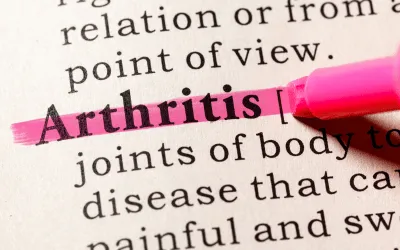About Arthritis
As the nation’s #1 cause of disability, arthritis affects nearly 60 million adults and 300,000 children. Over 100 types of arthritis and related conditions damage the joints and often other organs.
How can we assist you?
Helpful Tools for You

The Connection Between Arthritis and Heart Health: Risk Factors and Prevention
Arthritis and heart health are interconnected, with individuals having certain types of arthritis at a higher risk of developing heart disease. Shared risk factors and chronic inflammation contribute to this link. It is crucial to address heart health in individuals with arthritis due to the increased risk of heart-related complications. By managing risk factors, optimizing lifestyle choices, and seeking appropriate medical care, individuals can improve their overall well-being and reduce the chances of developing heart disease. A comprehensive approach that considers both arthritis and heart health is essential for better management and prevention.
Heart disease is a leading cause of mortality globally, encompassing various conditions that affect the heart and blood vessels. Risk factors include both non-modifiable factors like age and family history, as well as modifiable factors such as high blood pressure, high cholesterol, and unhealthy lifestyle choices. Heart disease has a significant impact on overall health, reducing quality of life and increasing the risk of complications. Understanding the risks and consequences of heart disease empowers individuals to make informed choices, adopt preventive measures, and work closely with healthcare professionals to mitigate risks and promote heart-healthy lifestyles.
Link Between Arthritis and Heart Disease
Chronic inflammation in arthritis can contribute to cardiovascular issues due to shared risk factors such as inflammation, obesity, and a sedentary lifestyle. Inflammatory substances released during arthritis promote the development of atherosclerosis and increase the risk of blood clots. Obesity and a sedentary lifestyle further increase the risk of both arthritis and cardiovascular problems. Addressing these shared risk factors through appropriate medical interventions, lifestyle modifications, and regular physical activity is crucial for managing both arthritis and cardiovascular health. Consulting healthcare professionals can provide personalized guidance in mitigating these risks and promoting overall well-being.
Lifestyle modifications play a crucial role in reducing the risk of heart disease and managing arthritis symptoms. Here are some key recommendations:
1. Healthy Diet:
Emphasize a balanced diet rich in fruits, vegetables, whole grains, lean proteins, and healthy fats.
Limit intake of saturated and trans fats, cholesterol, sodium, and added sugars.
Incorporate heart-healthy foods like fatty fish (rich in omega-3 fatty acids), nuts, seeds, and legumes.
Consider a Mediterranean-style diet, known for its heart-protective benefits.
2. Regular Exercise:
Engage in moderate-intensity aerobic activities (e.g., brisk walking, cycling) for at least 150 minutes per week, or vigorous-intensity activities for 75 minutes per week.
Include strength-training exercises at least twice a week to maintain muscle strength and joint stability.
Consult with a healthcare professional or physical therapist to develop an exercise plan that suits your abilities and arthritis condition.
3. Weight Management:
Maintain a healthy body weight to reduce strain on joints and decrease the risk of heart disease.
Incorporate portion control, mindful eating, and regular physical activity to achieve and maintain a healthy weight.
Seek guidance from a registered dietitian or healthcare professional for personalized advice.
4. Managing Arthritis Symptoms:
Follow the treatment plan prescribed by your healthcare provider, including medication, physical therapy, and other recommended therapies.
Practice joint protection techniques to minimize stress on affected joints.
Use assistive devices or adaptive tools to support daily activities and reduce joint strain.
Prioritize rest and pacing activities to avoid overexertion and prevent arthritis flares.
5. Prevention of Heart Health Issues:
Regularly monitor blood pressure, cholesterol levels, and blood sugar levels if applicable, and follow your healthcare provider's recommendations.
Quit smoking and avoid exposure to secondhand smoke.
Manage stress through relaxation techniques, mindfulness, and engaging in activities you enjoy.
Seek support from healthcare professionals and support groups to address any emotional or psychological challenges.
By adopting these lifestyle modifications, individuals can reduce the risk of heart disease, manage arthritis symptoms effectively, and promote overall health and well-being. It is essential to work closely with healthcare professionals to develop a personalized plan that considers your specific needs and health conditions.

Importance of Regular Check-ups and Screenings
Regular medical check-ups and screenings are crucial for monitoring both arthritis and heart health. They allow for early detection and management of potential issues, ensuring better outcomes and preventing complications. These check-ups assess arthritis progression, while specific tests and assessments related to heart health, such as blood pressure measurement, cholesterol screening, and stress testing, help identify risk factors and detect any abnormalities. By maintaining regular check-ups, individuals can actively manage their health, receive guidance on lifestyle modifications, and work closely with healthcare professionals to effectively monitor and address both arthritis and heart health. Prioritizing regular check-ups contributes to a healthier and more fulfilling life.
Strategies for Prevention and Wellness
Prevention strategies for individuals with arthritis include smoking cessation, stress management, weight management, regular exercise, and appropriate medication and medical interventions. Quitting smoking reduces disease activity and the risk of cardiovascular complications. Stress management techniques, such as mindfulness and relaxation exercises, minimize arthritis flares. Maintaining a healthy weight and engaging in regular exercise help reduce joint strain and improve symptoms. Medications, such as NSAIDs and DMARDs, control inflammation and pain. Medical interventions like injections and surgery may be considered for severe cases. Working closely with healthcare professionals ensures a comprehensive approach to managing both arthritis and related health concerns.
Support and Resources for Arthritis and Heart Health
Support groups, online communities, and organizations provide valuable information, assistance, and emotional support for individuals with arthritis and heart conditions. Examples include the Arthritis Foundation, American Heart Association, and local support groups. Seeking professional guidance from healthcare professionals such as rheumatologists and cardiologists is crucial for tailored care. Joining support groups and online communities offers a sense of belonging and access to shared experiences. Encouragement is given to connect with these resources and seek the support needed for managing arthritis and heart health effectively. Remember, you don't have to face these challenges alone – support and guidance are available.
Effects of Arthritis

Cause of Disability
In the United States, 23% of all adults, or more than 54 million people, have arthritis. It is a leading cause of work disability, with annual costs for medical care and lost earnings of $303.5 billion.

Workforce Effects
Sixty percent of US adults with arthritis are of working age (18 to 64 years). Arthritis can limit the type of work they are able to do or keep them from working at all.

Global Impact
In fact, 8 million working-age adults report that their ability to work is limited because of their arthritis. For example, they may have a hard time climbing stairs or walking from a parking deck to their workplace.
Promoting Interventions That Reduce Arthritis Pain
American Arthritis Foundation recognizes several proven approaches to reduce arthritis symptoms:
Be active. Physical activity—such as walking, bicycling, and swimming—decreases arthritis pain and improves function, mood, and quality of life. Adults with arthritis should move more and sit less throughout the day. Getting at least 150 minutes of moderate-intensity physical activity each week is recommended.
Protect your joints. People can help prevent osteoarthritis by avoiding activities that are more likely to cause joint injuries.
Talk with a doctor. Recommendations from health care providers can motivate people to be physically active and join a self-management education program. Should your arthritis be interfering with your activities of daily living you may be a candidate to receive many new treatments, and learn how to reverse the arthritis condition.
Have a question?
We're Here to Help
By providing my phone number, I agree to receive text messages from the business.

